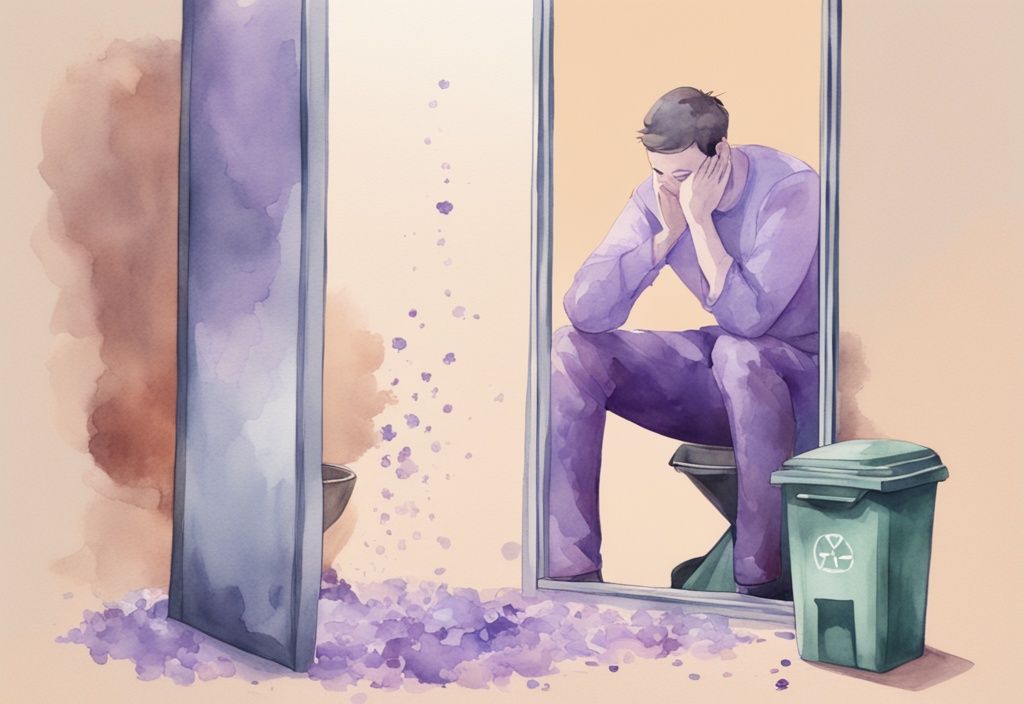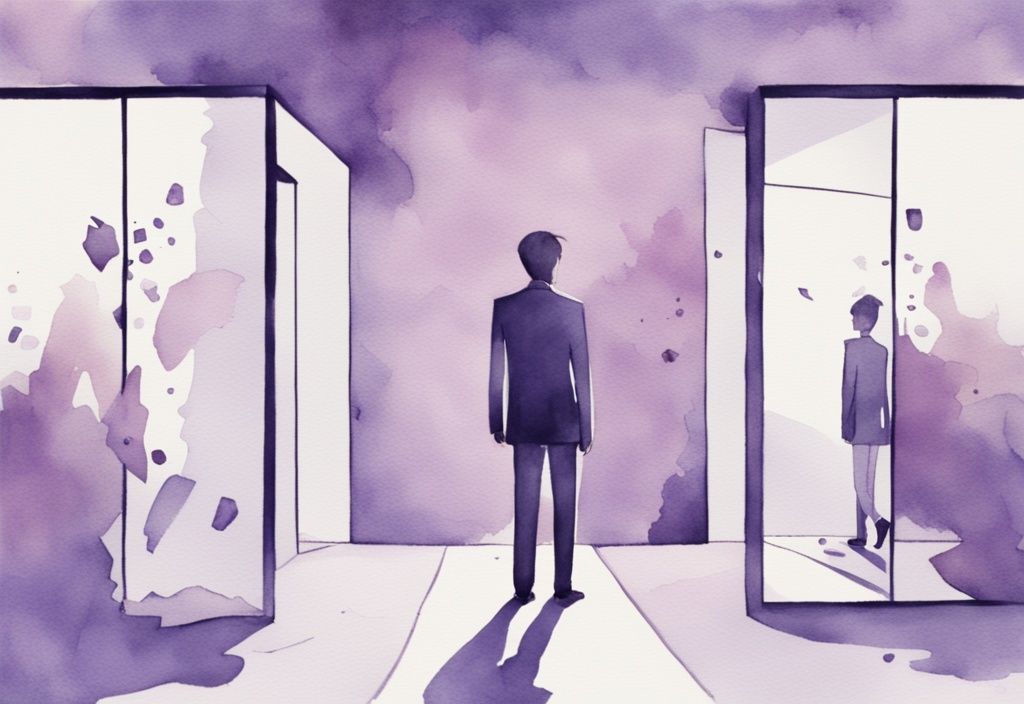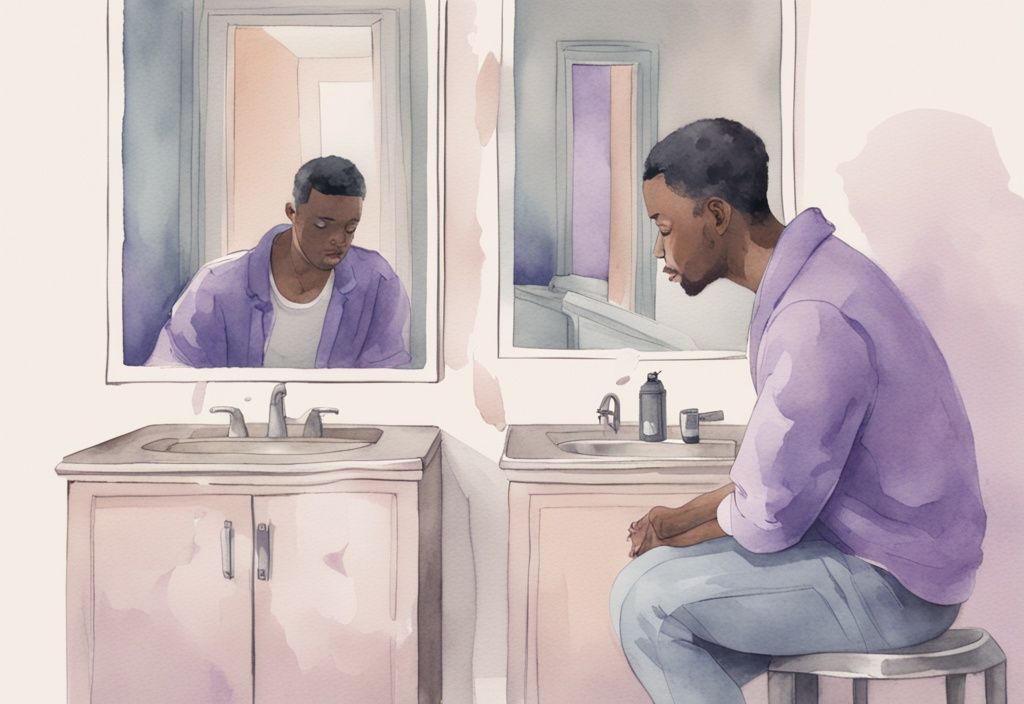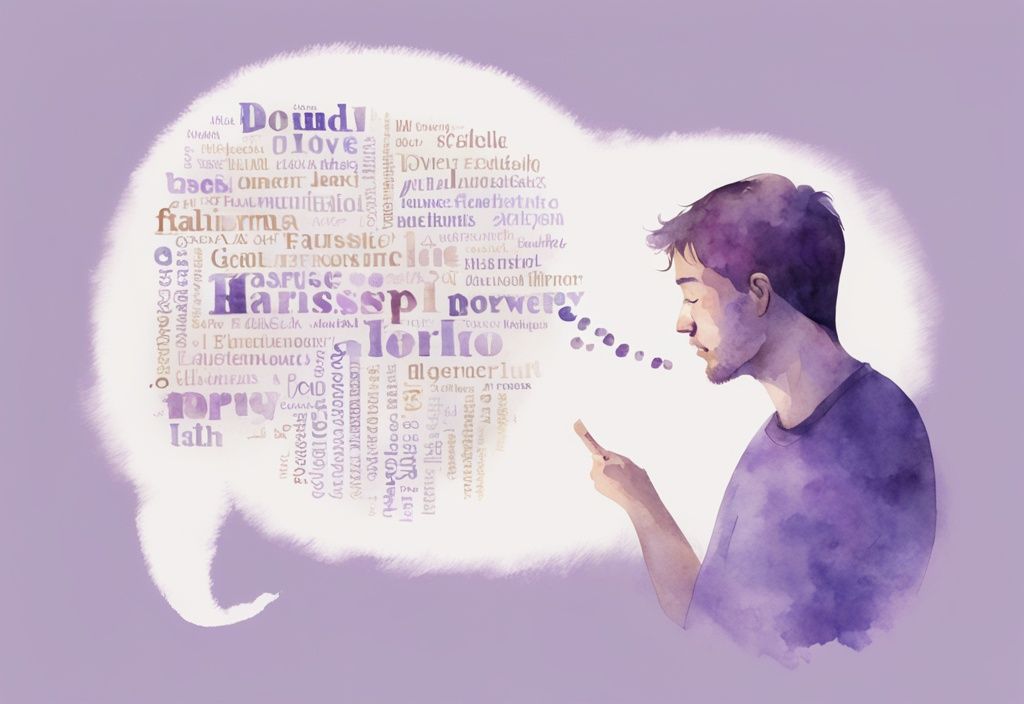Understanding Narcissist Discard: Navigate and Overcome Psychological Games
Have you ever been emotionally devastated by the abrupt ending of a relationship? You could be experiencing a narcissist’s cruel discard. This cold rejection is more than just a break-up; it’s a manipulative game that narcissists play. They drop existing partners when they fail to serve their ever-changing needs. But rest assured, you’re not alone, and there is a way out.
In this guide, I seek to shed light on the complexities of the narcissist relationship cycle, the crushing impacts of discard, and the crucial steps for recovery. Recovery isn’t just about getting through the day; it’s about rediscovering your worth and reclaiming your life.
Let’s navigate this difficult journey together, hand-in-hand. It’s high time you decoded the narcissistic playbook and took back control of your life.
The Narcissistic Relationship Cycle
Understanding the narcissistic relationship cycle can shed light on the tumultuous patterns that define these toxic connections. This cycle is typically divided into three distinct phases: Idealization, Devaluation, and the Narcissist Discard stage. Each phase is marked by specific behaviors and manipulations, which can leave the partner feeling exhilarated, confused, and ultimately abandoned.
The Three Phases of a Narcissistic Relationship
Idealization Phase
In the Idealization Phase, the narcissist begins their pursuit with grand gestures of admiration and affection, a tactic known as “love-bombing.” They inundate their partner with flattery, making them feel singularly special and irreplaceable. This overwhelming attention is designed to reel the partner in, building a seemingly unbreakable bond. The narcissist’s ultimate aim during this stage is to secure the partner’s trust and adoration, ensuring that the partner feels indispensable to the narcissist.
Devaluation Phase
The shift to the Devaluation Phase is often subtle at first. The narcissist begins to nitpick and find faults where there were none before, leading to incessant criticism and belittlement.
- They may employ gaslighting tactics, causing the partner to doubt their perception of reality.
- Feelings of confusion and anxiety become commonplace for the partner, who often strives to correct perceived flaws to win back the narcissist’s approval.
- This phase is riddled with emotional manipulation and control tactics aimed at undermining the partner’s self-worth.
Discard Phase
The final, most devastating phase is known as the Discard Phase. This is when the narcissist abruptly ends the relationship, leaving the partner feeling completely abandoned and used.
- The narcissist suddenly deems the partner unworthy or no longer useful, cutting ties without warning.
- This rejection is deeply painful, magnifying feelings of worthlessness and abandonment for the partner.
- Meanwhile, the narcissist seamlessly moves on to new sources of admiration and validation, ready to repeat the cycle with someone else.
The cycle’s progression from idealization to the harsh reality of the discard can be emotionally jarring and incredibly disorienting. Recognizing these phases can be the first step towards healing and breaking free from such toxic entanglements.
What is Narcissist Discard?
The concept of narcissist discard is one where individuals dealing with a narcissistic partner experience a sudden and often painfully confusing end to their relationship. This phase is marked by stark emotional shifts and significant psychological impacts, leaving the discarded partner grappling with feelings of worthlessness and emotional neglect. By understanding the characteristics of narcissist discard, we can better navigate the turbulence it brings and find a path toward healing.
Characteristics of Narcissist Discard
-
Abrupt and Unexpected: The narcissist discard phase often strikes out of nowhere, suddenly severing the relationship.
In this insightful video, Christina from the Common Ego Community delves into the concept of 'narcissist discard,' explaining the stages leading up to this abrupt end of a relationship and the emotional turmoil that follows. Learn about the narcissist's behavior during the discard phase and the importance of recognizing these patterns to aid in your healing journey.
It’s like a lightning bolt, leaving you stunned and disoriented. This abruptness exacerbates the emotional chaos, deepening your sense of betrayal and confusion. - Emotional Neglect: During the discard phase, narcissists may start ignoring or belittling you, eroding your sense of self-worth. This emotional neglect makes you feel insignificant, as if you no longer matter, compounding the distress of the experience.
- Objectification: In this phase, you’re reduced to an object, devoid of personal value or significance. The narcissist treats you as if you were disposable, further intensifying your feelings of worthlessness and dehumanization.
- Temporary or Permanent Separation: Discards can vary; sometimes, they’re merely temporary if the narcissist foresees a future benefit in reconnecting. At other times, discards are permanent, cutting off all ties completely. The nature of the discard hinges on the narcissist’s changing needs and whims.
- Smear Campaigns: Narcissists often embark on smear campaigns during a discard. They tarnish your reputation to redirect the blame for the breakup away from themselves. By casting themselves as the victim, they seek sympathy and preserve their self-image, leaving you to deal with the fallout.
Why Does Narcissist Discard Happen?
Understanding why a narcissist discard transpires can be profoundly unsettling and emotionally draining. This process is not only a consequence of the narcissist’s intrinsic traits but also a reflection of their deeply rooted insecurities and relentless quest for validation. Here are some key reasons why it occurs:
Reasons for Narcissist Discard
- The narcissist feels they can no longer control or manipulate the partner effectively: When the strings of control start to loosen, narcissists find themselves at a crossroads. They experience a petrifying loss of power, which threatens their fragile sense of superiority. This power vacuity compels them to initiate the discard, paving the way to seek someone more easily controlled.
- The partner no longer provides the narcissist with the desired level of admiration and ego-boost: Narcissists thrive on continual applause and validation. When their partner’s admiration dwindles, it feels like an unwelcome cold shower. They start sensing a void of fulfillment and respect. Consequently, this triggers the search for a new source of praise, leading to the familiar scenario of narc discard.
- The narcissist finds a new “supply” who better serves their needs: Treating relationships like juggling balls, narcissists often have several ‘supplies’ lined up. When a more promising source of admiration enters their radar, the previous partner is unceremoniously pushed off stage. This abrupt transition allows them to maintain their unending need for validation.
- The partner’s inability to assist with the narcissist’s life goals leads to their discard: Partners may become valued only for their utility in advancing narcissistic goals. When they no longer contribute effectively to these ambitions, they are seen as superfluous. This pragmatic and cold calculation fuels the discard, rendering the partner obsolete in the narcissist’s eyes.
- The narcissist perceives the partner as no longer useful to their self-image or ambitions: Narcissists are fundamentally self-absorbed and focus intensely on their image and goals. When a partner ceases to be an asset in enhancing their prestige or aiding their endeavors, the discard becomes inevitable. This fleeting sense of commitment underscores the whimsical and transactional nature of the narcissistic partner.

Signs and Symptoms of Narcissist Discard
The narcissist discard phase is marked by a series of manipulative and hurtful behaviors that can leave their partner feeling devastated and bewildered. Understanding these signs can help you recognize the abusive cycle and begin the process of healing.
Increased Criticism and Belittlement
During the narcissist discard phase, the narcissist significantly ramps up their criticism, often aiming to demean and undervalue their partner. They’re no longer satisfied with subtle jabs but resort to overt and relentless insults, which can severely undermine your self-esteem.
Any attempts to discuss or address these concerns are met with dismissiveness or outright hostility. This can manifest in various ways:
- Ignorance: Completely ignoring your feelings.
- Minimization: Downplaying your concerns as trivial.
- Redirection: Changing the subject to avoid accountability.
Hostility might show up through aggressive responses, defensiveness, or even gaslighting tactics designed to make you question your own experiences and feelings. This barrage of demeaning comments and resistance to open dialogue serves to further isolate you and break your spirit.
Gaslighting and Shifting Blame
In the midst of the narcissist discard, they expertly manipulate reality, twisting situations and conversations to make you doubt your own perceptions and memories. Gaslighting becomes a predominant tactic, eroding your trust in your own mind.
They skillfully place all responsibility for the relationship’s issues onto you, absolving themselves of any fault. This constant blame-shifting not only confuses you but also keeps you in a state of self-doubt and disorientation. It becomes increasingly difficult to stand up for yourself or recognize the abuse you’re enduring when your reality is constantly being questioned.
Finding a New Supply
During the narcissist discard phase, the narcissist starts seeking new individuals who can provide the admiration and validation they crave. This transition is often abrupt, leaving you feeling replaced and devalued. Their interest in a “new supply” is not gradual but sudden and conspicuous, causing additional emotional harm.
This behavior underscores their view of you as interchangeable. Once your utility or novelty wears off, they discard you in favor of someone new who can fulfill their insatiable need for ego-boosting and validation.
Heightened Abuse and Cruelty
As the narcissist discard phase progresses, the level of abuse and cruelty can escalate dramatically. This period may see an increase in emotional, verbal, and even physical abuse. The narcissist appears to derive sadistic pleasure from your suffering, taking advantage of your vulnerable state to inflict maximum pain.
This heightened abuse serves several purposes for the narcissist:
- Reinforcing Dominance: Ensuring they have control over you.
- Depleting Self-Worth: Further diminishing your self-esteem.
- Emotional Debilitation: Keeping you emotionally fragile and easier to control.
This cruelty is a hallmark of the narcissist discard process, leaving lasting psychological scars that can take significant time and effort to heal.
The Psychological Impact of Narcissist Discard
Experiencing narcissist discard can be a deeply jarring and tumultuous process. When a narcissist suddenly ends a relationship, it doesn’t just break a bond; it shatters the very foundation of one’s emotional wellbeing. This abrupt cessation of affection and attention can lead to profound psychological repercussions, often leaving a trail of emotional debris that’s challenging to navigate.
Emotional Repercussions
- Feelings of Devastation: The end of a relationship due to narcissist discard often triggers overwhelming feelings of devastation. Imagine building a beautiful sandcastle only for a wave to destroy it in an instant. Partners find themselves lost and heartbroken, trying to make sense of the sudden void.
- Sensations of Rejection: Rejection strikes deeply as partners grapple with the narcissist’s abrupt withdrawal. It’s like being enveloped in a warm hug one moment, only to be pushed away coldly the next. This sensation can disorient one’s emotional compass, leading to intense feelings of invalidation.
- Perceived Worthlessness: The discard phase often inflicts a crippling sense of worthlessness. Repeated cycles of idealization and devaluation diminish self-worth, making partners feel insignificant and undervalued. To understand more about how a narcissist playing victim impacts relationships, read our detailed analysis.
- Dropping Self-Esteem: The plummeting self-esteem is a direct consequence of the narcissist discard. Partners begin to doubt their abilities and question their value, resulting in a significant drop in self-confidence.
- Emotional Trauma: Anxiety and depression frequently follow the emotional upheaval inflicted by the narcissist. Imagine being on a relentless emotional roller-coaster; the trauma from such an experience can be long-lasting and often requires professional help to overcome.
Unresolved Childhood Wounds
- Trigger for Past Issues: Narcissist discard can be a potent trigger for unresolved childhood wounds. Feelings of rejection or abandonment might resurface old emotional scars from early neglect or emotional withdrawal.
- Crucial Healing: Addressing these deep-rooted issues is paramount for recovery. Healing childhood wounds can improve overall life quality, paving the way for healthier future relationships.
- Self-Awareness: Understanding the connection between past traumas and current emotional pain is crucial. This awareness is like holding a lantern in a dark maze, helping you comprehend the depth of the impact and navigate your path to healing.

Remember, you are not alone in this journey. Your experiences and emotions matter, and finding pathways to healing is a testament to your resilience and strength.
Coping Strategies After Narcissist Discard
No Contact Strategy
The first and arguably most vital step after a narcissist discard is establishing a no-contact strategy. This involves cutting all forms of communication with the narcissist to avoid further manipulation or emotional harm. By doing so, you extricate yourself from the toxic cycle of abuse and create a safe space for healing. This boundary is not merely a physical one but also an emotional barrier that fosters recovery.
- Avoiding all communication channels helps break free from the cycle of abuse.
- Creating a safe emotional space is crucial for healing.
Prioritizing Self-Care
Next, focusing on self-care becomes essential. Engaging in activities promoting physical, emotional, and mental well-being significantly boosts recovery after a narcissist discard. This could mean setting aside time for hobbies that spark joy, indulging in relaxation techniques, or engaging in self-reflection. Each of these activities not only rebuilds one’s self-esteem but also reinforces a sense of self-worth that might have been eroded.
- Participate in activities that foster well-being.
- Rebuild self-esteem through hobbies and relaxation.
Seeking Professional Help
Another crucial step is seeking professional help. Consulting therapists or counselors specializing in narcissistic abuse offers essential guidance and support. These professionals provide tools to process trauma, rebuild self-esteem, and learn healthier relationship patterns post-discard. Therapy acts as a cornerstone in your healing journey, providing a structured space to navigate your emotions and thoughts.
- Consult therapists specializing in narcissistic abuse.
- Benefit from professional guidance in trauma processing.
Harnessing Support Networks
Leaning on your support network of friends, family, or support groups is invaluable. Emotional support from people who understand your situation validates your feelings and experiences. Sharing your journey with others who have faced similar challenges creates a sense of community and healing. This collective experience can provide a powerful reminder that you are not alone.
- Turn to friends, family, or support groups for emotional support.
- Share experiences to foster community and healing.
Setting Boundaries
Finally, setting boundaries is imperative for long-term recovery. Establishing clear boundaries protects you from further emotional harm and manipulation by the narcissist. Learning to say no and prioritizing your own needs over the narcissist’s demands is essential for maintaining self-respect and well-being. These boundaries act as a shield, empowering you to reclaim your autonomy and peace.
- Protect yourself by establishing clear boundaries.
- Prioritize your needs and learn to say no.
Rebuilding and Healing After Narcissist Discard
Rebuilding and healing after a narcissist discard is a deeply personal journey. The experience can leave you feeling disoriented and lost. Understanding the underlying dynamics and focusing on your growth can help restore your sense of self. Here are key areas to concentrate on:
Recognizing It’s Not About You
- Understanding the Narcissist’s Issues: Healing starts with realizing the narcissist’s actions stem from their own issues, not your shortcomings. A narcissist discards partners to shield their fragile ego and feed their need for admiration. Visualize their actions as a reflection of their brokenness, not a measure of your worth. This detachment is an emotional balm, soothing the wounds they left behind.
- Acceptance and Letting Go: Accepting that you can’t change or control a narcissist’s behavior is a powerful step toward liberation. Their actions mirror their personality disorder, not your value or actions. Picture this acceptance as a key to unlock your chains, freeing you from misplaced guilt and unwarranted responsibility. Embrace this truth to lighten your emotional burden.
Focusing on Personal Growth
- Investing in Yourself: Post-discard, channel your energy into self-improvement. This might involve activities that nurture your mind and spirit, like reading, exercising, or meditating. Think of this as watering your soul’s garden, allowing new flowers of identity and joy to bloom. Finding and pursuing new hobbies can rekindle your passions and help you reclaim your authentic self.
- Exploring New Horizons: Embrace new experiences and opportunities. Learning new skills or diving into activities that pique your interest can shift your focus from loss to growth. Imagine building a robust foundation of abilities that stand strong outside the shadow of past relationships, blossoming into confidence and paving the way for a fulfilling future.
Cultivating Healthy Relationship Skills
- Understanding Healthy Dynamics: Learn about healthy relationship dynamics and effective communication. This knowledge is like building a reliable map that guides you toward mutual respect, trust, and emotional support. Recognizing these principles sets the stage for nurturing a balanced and nourishing relationship.
- Practicing Essential Skills: Develop skills such as assertiveness, empathy, and active listening. Assertiveness empowers you to maintain boundaries without aggression, empathy fosters deeper connections, and active listening builds trust and understanding. Picture each skill as a brick, constructing the path to healthier relationships.
- Building Mutual Respect: Mutual respect is the cornerstone of any healthy relationship. Future connections should emphasize reciprocal admiration and respect, creating a foundation of emotional safety and growth. Think of mutual respect as the glue that holds the fabric of a strong relationship together.
Remember, the journey of healing and rebuilding after a narcissist discard is personal and unique. Prioritize self-care, seek support, and invest in your growth to emerge stronger and happier. Embrace this path with compassion and patience, allowing each step to guide you toward healing.
Exploring Narcissistic Behaviors After Discard
When a narcissist discards their partner, it can feel like the ground has been pulled out from under you. Understanding the potential behaviors that follow can provide clarity and prepare you for what might come next, as the narcissist often seeks to regain control in unexpected and manipulative ways.
Hoovering Attempts
The aftermath of narcissist discard often includes hoovering attempts, where the narcissist seeks to re-establish contact. This is primarily to regain a sense of control or to validate their ego.

- It’s vital to recognize that these attempts are not rooted in genuine affection or regret. Instead, they are tactics to draw you back into the cycle of abuse and maintain their influence over you.
- Hoovering can take many forms, such as unexpected messages, apologies, or declarations of change. These gestures are a litmus test to see if you can still be manipulated to fulfill the narcissist’s needs.
Smear Campaigns
During and after the narcissist discard, they may engage in smear campaigns. This involves spreading false information and blaming you for any issues that led to the breakup.
- The aim of these campaigns is twofold: to protect the narcissist’s self-image and to manipulate others into perceiving them as the victim.
- This tactic can often isolate you from mutual friends and social circles, making it more challenging to find support and validation during this difficult period.
Sudden Indifference or Anger
After the discard phase, you might observe sudden indifference or irrational anger from the narcissist. This shift in behavior is intended to destabilize you and erode any remaining self-worth.
- The narcissist might abruptly cut off communication or show unexpected disdain, reinforcing feelings of confusion and rejection that you experience.
- This indifference or anger is not a spur-of-the-moment reaction but a calculated effort to uphold their control and ensure you internalize the responsibility for the failed relationship.
Recognizing these behaviors can be the first step towards breaking free from their toxic influence and beginning your journey of healing.
Conclusion
Understanding the narcissist discard process is an essential step in the journey to recovery and healthier future relationships. The abrupt end of the relationship often leaves the partner feeling devastated, rejected, and worthless. However, comprehending this discard process can lead to significant personal growth and clarity.
Recognizing the patterns of narcissistic abuse is key for survivors to identify the toxic behaviors and control tactics used by narcissists. It allows individuals to break free from the cycle of abuse. Emotionally manipulative acts, such as love-bombing, gaslighting, and intense criticism, disrupt one’s sense of reality. The final discard phase, in particular, can be quite harsh, leaving lasting emotional scars.
Empowerment comes from awareness and education. By equipping oneself with knowledge about narcissistic behaviors, one can navigate the painful aftermath of the discard with greater resilience. Establishing strict boundaries, seeking professional help, and leveraging a supportive network are pivotal steps toward healing. Self-care and prioritizing mental well-being set the foundation for reconciling past traumas and fostering future relationships built on mutual respect and empathy.
Moving forward, it’s crucial to remember that the narcissist discard reflects the narcissist’s issues, not personal deficiencies. Personal growth, self-improvement, and a deeper understanding of healthy relationship dynamics are integral to rebuilding one’s life.
In conclusion, though the journey through the aftermath of a narcissist discard can be arduous, it offers a unique opportunity for profound personal development and a chance to cultivate healthier, more fulfilling relationships. With a clear understanding of these dynamics, individuals can reclaim their lives and move toward a positive and empowering future.
FAQ
Understanding the Narcissist Discard in Relationships
What is the narcissist discard in a relationship?
- The narcissist discard is the abrupt and often unexpected end of a relationship by a narcissist. This sudden termination leaves the partner feeling profoundly used, betrayed, and abandoned.
How does narcissist discard impact a person emotionally?
- The emotional impact of a narcissist discard can be deeply devastating. Those on the receiving end often grapple with intense feelings of rejection and worthlessness. The experience can trigger anxiety, depression, and even long-lasting emotional trauma. It’s akin to having the rug pulled from under you, leaving a void that seems insurmountable.
What are some signs that a narcissist is about to discard you?
- Recognizing the signs of an impending narcissist discard can save you some heartache. Key indicators include a sudden increase in criticism, incessant gaslighting, and seeking new sources of admiration. Verbal and emotional abuse may become more frequent and intense, signaling an upcoming discard.
How can one cope with the aftermath of a narcissist discard?
- Coping with a narcissist discard is challenging but not insurmountable. Effective strategies include going no contact to protect your emotional well-being and prioritizing self-care. Seeking professional help can provide guided support, while leveraging your support network offers a safety net. Setting firm boundaries is also crucial in healing and moving forward.
Why do narcissists often jump into new relationships quickly after a discard?
- Narcissists frequently leap into new relationships right after a discard to feed their ego. These new connections act as a source of fresh admiration and validation, bolstering their self-esteem and sense of self-worth. It’s a recurring cycle of seeking and discarding that perpetuates their need for attention.
Is narcissist discard always permanent?
- The permanence of a narcissist discard isn’t set in stone. It can be either temporary or permanent, largely depending on the narcissist’s fluctuating needs. They might return if they seek control or further validation, creating an unpredictable and unstable dynamic.














Post Comment